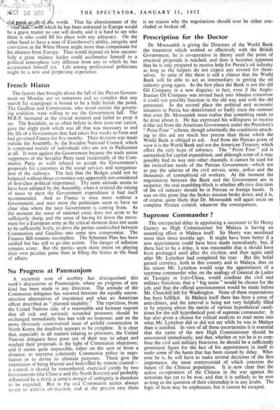Prescription for the Doctor
Dr. Moussadek is giving the Directors of the World Bank the treatment which worked so effectively with the British Government; he is co-operative in theory until the point of practical proposals is reached, and then it becomes apparent that he is only prepared to receive help for Persia's oil industry as long as the helpers do not expect any reward for them- selves. In spite of this there is still a chance that the World Bank will be able to act as intermediary in getting the oil industry going again. In the first place the Bank is not the old Oil Company in a new disguise; in fact, even if the Anglo- Iranian Oil Company was invited back into Abadan tomorrow it could not possibly function in the old way and with the old personnel. In the second place the political and economic' situation in Persia has deteriorated so badly since the summer that even Dr. Moussadek must realise that something needs to be done about it. He has expressed his willingness to receive dollar aid from the American Government under the President's "Point Four" scheme, though admittedly the conditions attach- ing to this aid are much less precise than those which the World Bank is obliged to ask. And from the Persian point of view it is the World Bank and not the American Treasury which offers the only hope of solvency. The "Point Four" aid is earmarked for capital expenditure, and although some of it may possibly find its way into other channels, it cannot be used for the immediate needs of the Persian Government—which are to pay the salaries of the civil service, army, police and the thousands of unemployed oil workers. At the Moment the negotiations between the Bank and the Government are in suspense; the real stumbling-block is whether effective direction of the oil industry should be in Persian or foreign hands. It was on this point that the Stokes mission broke down, and it is, of course, quite likely that Dr. Moussadek will again insist on complete Persian control, whatever the consequences.


































 Previous page
Previous page